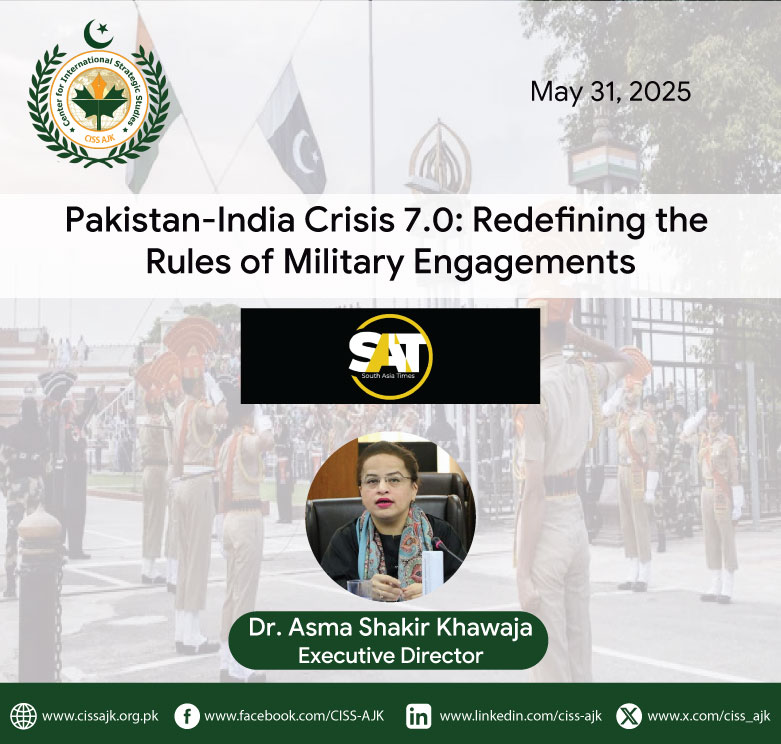The latest Pakistan-India crisis 7.0 has redefined the modern concept of warfare. Students and scholars of strategic studies would keep analyzing the learning outcomes of this swift and focused war like situation between the two hostile nuclear neighbors. In military terms, the “Rules of Engagement” (RoE) are the tactical manifestation of strategic designs and options. It explains that how and when armed forces can use force during a conflict. These rules define the framework to employ the circumstances, conditions, degree, and manner in which force can be applied.
Redefining Rules of Engagement in a Nuclear Shadow
It has been observed that during the Pehalgam crisis Pakistan and India applied different rules of engagement in the light of their respective strategic priorities. Pakistan initially practiced strategic patience with credible signalling regarding its military preparedness. However, Indians appear to trust actions more than words. Resultantly Pakistan’s action made India to accept ceasefire only in few hours.
In terms of RoE, the first thing to discuss was the escalation policy. India used different mediums and tactics for swift escalation towards an armed conflict to minimize the space for rational decision making for Pakistan and to build pressure for immediate reaction instead of a calculated response. Such escalation under nuclear over hang could cost the lives of billions of South Asias but apparently Indian policy makers were relying on the rationality of their rivals. Pakistan has redefined the concept of limited war by deterring India from conventional and nuclear full-scale war without applying theatrical level tactics.
Another important new normal was the horizontal expansion of escalation landscape instead of vertical one. The horizontal expansion includes the spheres of cyber technology, military technology, integration of tactics, militarization of sea, and attack on civilian infrastructures such as dams. Expansion of traditional space for limited battleground was an effort to carve out a space for war within the conventional domain between two nuclear powers. Modi regime should realise that one country can start a war but it needs two to end it or decide the scale of it.
Deterrence Through Discipline and Innovation
While applying the RoE of Pakistan’s choice as a responsible nuclear power Pakistan responded through non-escalatory options to refrain India from enhancing the scale of war. The means and methods applied by Pakistan were only indicated upon her aim to deter the enemy, nothing else. As the Chief of Army Staff Gen. Syed Asim Munir stated about Pakistan’s policy to emerge as a hard state therefore Pakistan’s response was firm and focused. Technological domain appeared to be more effective and non-escalatory during the current crisis. It helped averting the coercive tactics, reduced the space for any surprise and highlighted the significance of integration of technology in contemporary battlefield.
In order to establish new normal in security structures, India violated the international border to attack her targets in Pakistan. For these irrational choices to establish new normal has shocked the strategists across the globe as everyone realized the dangerous such choices would pose. Manifestation of this irrationality played a pivotal role in isolating India without any considerable support by international community except two states known as revisionist state actors. This is right time for the US policy makers to chalk out an effective strategy to deal with revisionist India.
It is important to note down that Pakistan did not respond until India started attacking her military installations with the hope to limit Pakistan’s warfighting capacity. Indian policy makers misunderstood Pakistan’s strategic silence as political unwillingness to respond to Indian aggression. Along with other aspects of warfare Indians diligently need to work on “issues of epistemology,” to improve their predictions about Pakistan. Pakistan’s response was a contemporary implementation of Blitzkrieg with integration of modern technology.
Pakistan’s Response and Technological Integration
Pakistan presented a classic example in the context of military command and control known as C4 I2, that stands for Command, Control, Communications, Computers (Cyber), Intelligence, and Interoperability. It represents the integration of these elements to improve decision-making and enhance battlefield effectiveness. Significantly, Pakistan used C4 I2 for damage limitation and limiting the warfighting capacity of Indian military by restricting their maneuvering few hundred miles within Indian borders. It further facilitated to establish a balance of power or balance of terror between two asymmetric armed forces. An excellent command over C4 I2 and perfect integration of technology has redefined the concept of military equilibrium in contemporary warfare. The students of warfare and strategy will use it as a case study to learn the application of C4 I2.
India’s Strategic Miscalculations and Diplomatic Isolation
The fruits of BJP’s aggressive posturing, facilitation of extra judicial killings of dissenting voices of India’s concern, political peddling in foreign countries, support for radical Hindutva ideology at global level, and non-diplomatic approach and language of S. Jaishankar, Minister for External Affairs were cultivated by Modi regime during the latest crisis. Ironically, Modi regime is calling for boycott of Turkey and Azerbaijan for their support for Pakistan but unable to utter a word about China, Russia and the US. This shows the vulnerable space India is surviving in.
Dr. Asma Shakir Khawaja
Dr. Asma Shakir Khawaja is the Founding Executive Director of the Center for International Strategic Studies, AJK, and the first woman appointed to this role by Pakistan’s National Command Authority. A former Head of Strategic Studies at NDU Islamabad, she established Pakistan’s first Department of Peace and Conflict Studies. She is the author of “Shaking Hands with Clenched Fists” and was selected for the Allama Iqbal Chair at Cambridge University. Her expertise includes strategic studies, peacebuilding, and Pakistan-India relations.



